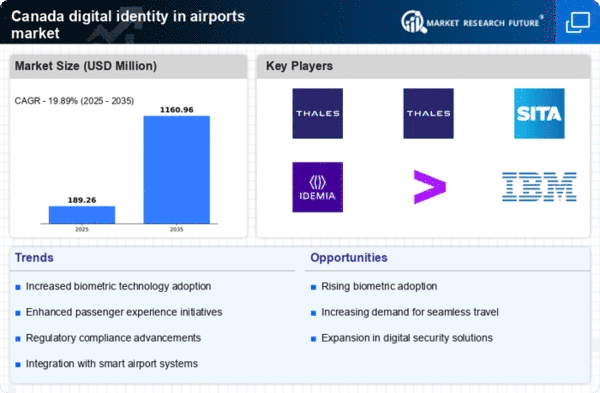Increased Passenger Volume
The digital identity-in-airports market is poised for growth as passenger volumes continue to rise in Canada. With an increase in both domestic and international travel, airports are under pressure to enhance their operational capabilities. The Canadian Transportation Agency reported a 15% increase in air travel demand in recent years, necessitating the implementation of efficient identity verification systems. Digital identity solutions, particularly biometric technologies, are being adopted to manage this influx effectively. By streamlining processes and reducing bottlenecks, these solutions are essential for accommodating growing passenger numbers, thus driving the digital identity-in-airports market.
Regulatory Support and Compliance
The digital identity-in-airports market is significantly influenced by regulatory frameworks that promote the use of digital identity solutions. In Canada, government initiatives aimed at enhancing airport security and passenger safety are driving the adoption of digital identity technologies. The Canadian government has implemented regulations that encourage airports to adopt biometric systems, ensuring compliance with international security standards. This regulatory support is expected to bolster market growth, with an estimated increase in investment in digital identity solutions by 25% over the next few years. Such compliance not only enhances security but also fosters trust among passengers, further propelling the digital identity-in-airports market.
Focus on Enhanced Customer Experience
The digital identity-in-airports market is increasingly driven by the need to enhance customer experience. Canadian airports are recognizing that efficient identity verification processes can significantly improve passenger satisfaction. By implementing digital identity solutions, airports can offer faster check-in and boarding experiences, which are crucial in today’s competitive travel environment. Surveys indicate that 70% of travelers prefer airports that utilize biometric technology for seamless processing. This focus on customer experience is likely to propel investments in digital identity solutions, as airports strive to meet evolving passenger expectations and improve overall service quality.
Integration of Advanced Data Analytics
The digital identity-in-airports market is benefiting from the integration of advanced data analytics into identity verification processes. Canadian airports are increasingly leveraging data analytics to enhance security measures and optimize operational efficiency. By analyzing passenger data, airports can identify patterns and potential security threats, thereby improving the effectiveness of their identity verification systems. This integration is expected to grow, with forecasts suggesting a 20% increase in the use of data analytics in airport operations over the next few years. Such advancements not only bolster security but also streamline processes, making them vital for the digital identity-in-airports market.
Technological Advancements in Biometrics
The digital identity-in-airports market is experiencing a surge due to rapid advancements in biometric technologies. Innovations such as facial recognition, fingerprint scanning, and iris recognition are becoming increasingly sophisticated, enhancing the efficiency of passenger processing. In Canada, airports are integrating these technologies to streamline check-in and boarding processes, thereby reducing wait times. According to recent data, the adoption of biometric systems in Canadian airports is projected to increase by 30% over the next five years. This trend not only improves operational efficiency but also elevates the overall passenger experience, making it a crucial driver for the digital identity-in-airports market.
















